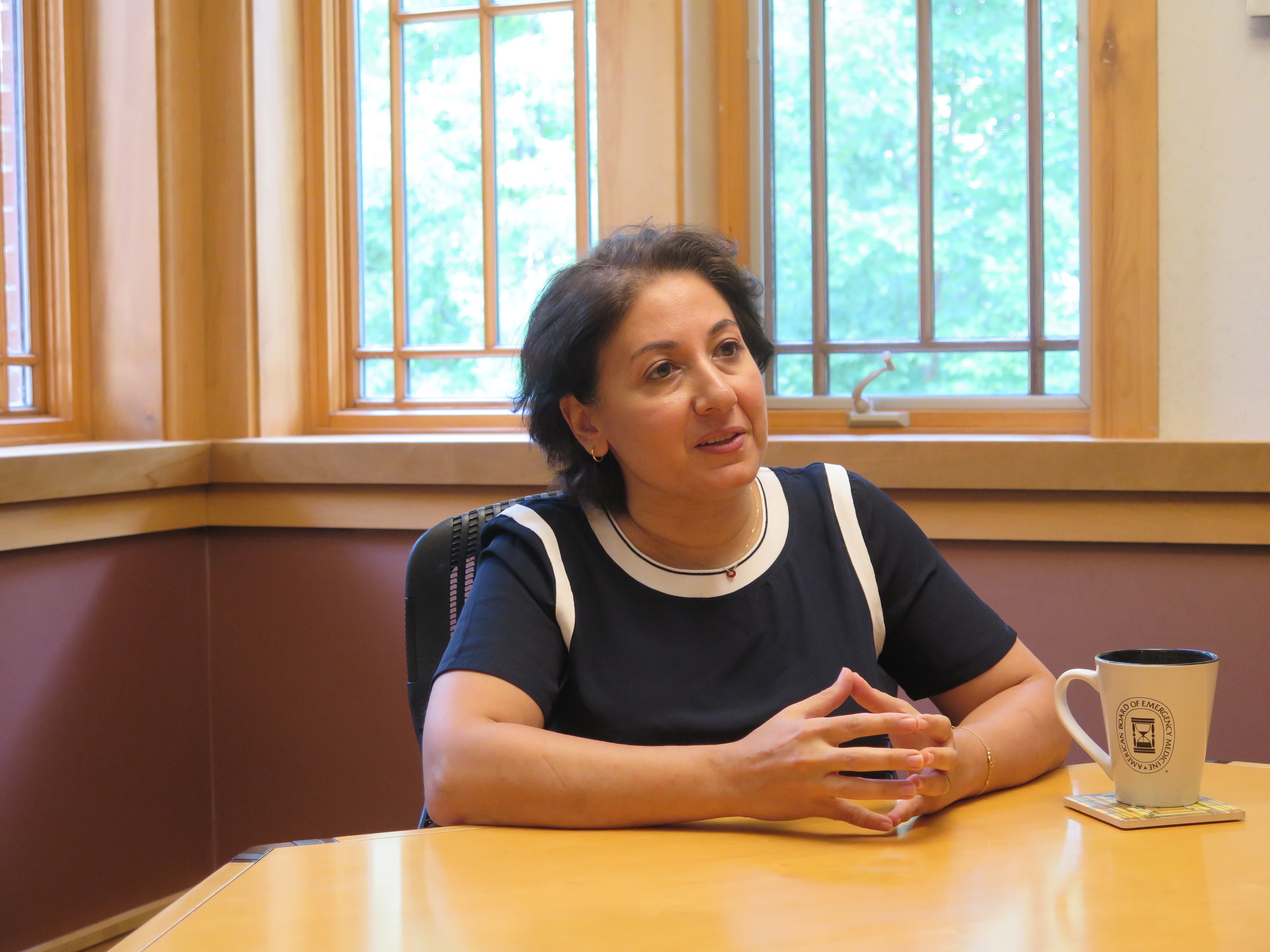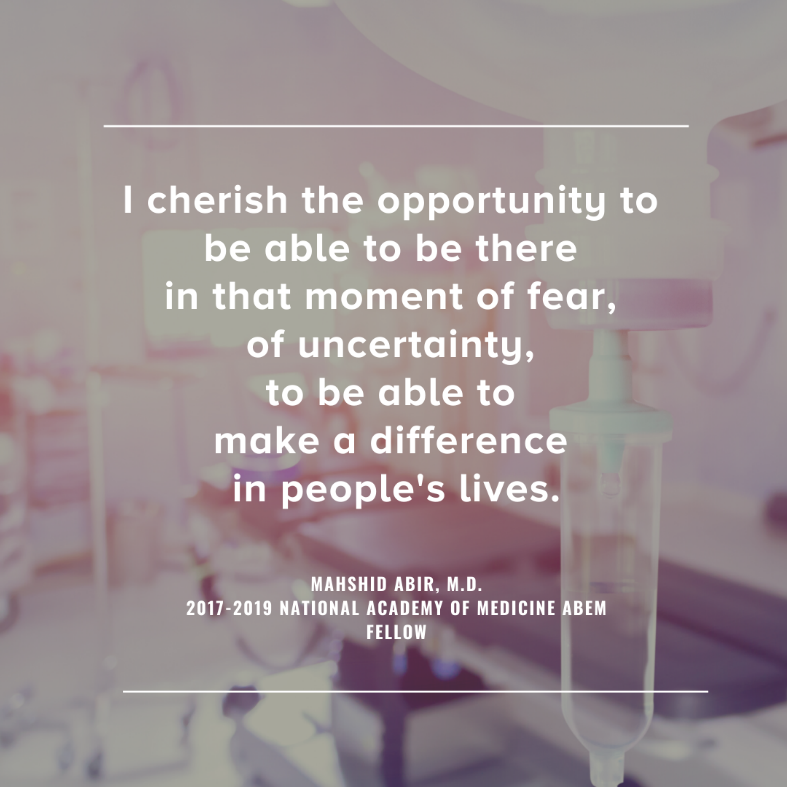 Mashid Abir, M.D., is an Associate Professor of Emergency Medicine at the University of Michigan Department of Emergency Medicine, and was the 2017-2019 National
Academy of Medicine ABEM Fellow.
Mashid Abir, M.D., is an Associate Professor of Emergency Medicine at the University of Michigan Department of Emergency Medicine, and was the 2017-2019 National
Academy of Medicine ABEM Fellow.
Dr. Abir recently had the opportunity to visit the ABEM office and share her experiences. In the interview below, Dr. Abir was asked to reflect on her experiences as the NAM ABEM Fellow and as an emergency physician.
What did it mean to you to have the National Academy of Medicine ABEM Fellowship opportunity?
I think that it is one of the most significant opportunities of my career. I’ve had a lot of opportunities. I was a clinical scholar in the Robert Wood Johnson program and I’ve been on the faculty of different academic Emergency Medicine departments.
Those were all great opportunities. This fellowship, especially in terms of when it came during my career, really allowed me to show, as an emergency physician and health services researcher, how much I can contribute, both as a content expert in
my area and as a methodologist. To be able to represent our specialty at that level has been a fantastic opportunity for me.
Building on my current network of collaborators, mentors, and colleagues across the nation, not just from Emergency Medicine, allowed me to really expand that network and reach out to different people who I’ve met for various activities and projects.
It’s been tremendously helpful for my career. For Emergency Medicine to have representation at that level, I think is very important.
What influenced your decision to choose Emergency Medicine as a specialty?
I was drawn to Emergency Medicine, because I think that we’re ultimately the consummate diagnosticians. We are the safety net. In every community I practice, over my ten years of practice, I’ve been in pretty diverse settings. I love the fact
that we have our finger on the pulse of the community from every socioeconomic status, from all sorts of backgrounds, and that we don’t turn people away. Those are some of the things that drew me to Emergency Medicine.
What do you value most about having ABEM certification?
I think it’s a symbol of being part of a larger community of physicians who have so much impact on populations across the U.S. There’s definitely a sense of pride associated with that, to have been able to be part of this group of amazing
people, who ultimately are in it for service. That’s symbolic for me in that way. It obviously keeps me on my toes to make sure I’m certified.

How do you think Emergency Medicine as a specialty has grown over the last 40 years?
I think that there has been an evolution of evidence-based medicine within Emergency Medicine that has grown significantly. I think that Emergency Medicine is getting more recognition from the medical community in general and in relation to other specialties.
We’re getting more credit, which I think is always something that we’ve needed and wanted as a specialty. I think the people are really understanding our position related to policy issues because we are the safety net and are the only
specialty that can claim that we touch primary care, ambulatory care, urgent care, EMS, and inpatient care every day.
The view that we have from both population health and community health perspectives puts us in a unique position from which we can inform policy and practice. We also can be represented in leadership in health care systems and community because of the
visibility that we have into all these different important areas.
What is one moment in your career as an Emergency Medicine physician that stands out?
I was recently asked a similar question and I think that the expectation was that I would say something that was, you know, "I saved ..." In our field we save lives. We do that. And there are a lot of dramatic stories that I have and can share, but the
one that sticks out to me is one from my residency in Philadelphia.
I trained at Jefferson and that hospital and emergency room truly capture the entire socioeconomic spectrum. You have diplomats and people who are homeless and everything in between. I remember as a resident, I must’ve been in my second year, and
there was this gentleman who came to the ER for belly pain a few times. He came four times within a two-week span. I happened to see him two out of the four times that he came. The fourth time, again, I was one of the doctors on and I said, "Is this
the same pain?" "Yes, it is." I said, "What is the reason you’re coming back?" He just looks at me and says, "Doc, I have disparity." He elaborated on how he was socially isolated. He was lonely, he had depression, he had no one. And he labeled
it disparity, and to this day, I have never forgotten that experience. Because, of everything that we’re there for, we’re there for people. People who have no money to go anywhere else. People who have acute illnesses that only we can
treat in the time-sensitive way that that condition deserves. He says he came in for belly pain, but the reason is really something else—it’s because life is not treating me well, and I have nowhere else to go, I have no resources. My
utilities are turned off. Help me, even give me a meal. Or is there a social worker I can talk to? Or that I may even be suicidal or whatever it may be. I think one of the decision points for Emergency Medicine for me, was this. Do I want continuative
care, or do I want that episodic one-time opportunity? And I cherish, to this day, after ten years of practice, that one opportunity with patients and families . . . No one’s having a good day when they’re coming to the ED. It’s
the ultimate equalizer. It doesn’t matter who you are. If you’re there, you’re not having a good day. I know some people are having worse days than others and I cherish the opportunity to be able to be there in that moment of fear,
of uncertainty, to be able to make a difference in people’s lives.